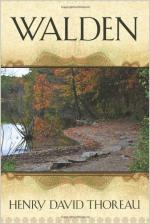|
|
Walden Baker Farm
Thoreau says that he pays visits to particular trees in place of going to visit a great scholar.
"Once it chanced that I stood in the very abutment of a rainbow's arch, which filled the lower stratum of the atmosphere, tinging the grass and leaves around, and dazzling me as if I looked through colored glass crystal. It was a lake of rainbow light, in which, for a short while, I lived like a dolphin. If it had lasted longer it might have tinged my employments and life. As I walked on the railroad causeway, I used to wonder at the halo of light around my shadow, and would fain fancy myself one of the elect. One who visited me declared that the shadows of some Irishmen before him had no halo about them, that it was only natives that were so distinguished. Benvenuto Cellini tells us in his memoirs, that, after a certain terrible dream or vision which he had during his confinement in the castle of St. Angelo, a resplendent light appeared over the shadow of his head at morning and evening, whether he was in Italy or France, and it was particularly conspicuous when the grass was moist with dew. This was probably the same phenomenon to which I have referred, which is especially observed in morning, but also at other times, and even by moonlight. Though a constant one, it is not commonly noticed, and, in the case of an excitable imagination like Cellini's, it would be basis enough for superstition. Beside, he tells us that he showed it to very few. But are they not indeed distinguished who are conscious that they are regarded at all?" Baker Farm, pp. 176-77
Thoreau walks through Baker farm on the way to Fair Haven to fish. He had thought of living here before settling on Walden and getting squatter's rights there. At Baker farm, he goes fishing and gets driven from the water by a huge clap of thunder and lightening that almost immobilize him.
While waiting in the rain, he meets John Field, a poor Irish immigrant who lives in the rundown house at Baker Farm that Thoreau would have used. John Field bogs (turns up topsoil on a farm in exchange for some acreage to plant) with his son, and works very hard for very little in return. Thoreau tries to convince him that if he lived more simply, he would not need the little money he now makes, and could stop working. He would only have to search for his food, which is in abundance in the area. But he'd have to give up tea and coffee, butter, milk, and beef. Thoreau says that the only true America is a place where you can choose to live without those things, and still be happy. Thoreau continues in this philosophical vein with the family, but they aren't able to hear it. The family can't live without the things Thoreau lists, and John Field doesn't seem to be able to fish properly and so support the family. They are heading for another goal entirely, and can't stop now. It seems to Thoreau that the course towards possession and a dependence on the products of society is a cycle that traps people inside.
"As I was leaving the Irishman's roof after the rain, bending my steps again to the pond, my haste to catch pickerel, wading in retired meadows, in sloughs and bog-holes, in forlorn and savage places, appeared for an instant trivial to me who had been sent to school and college; but as I ran down the hill toward the reddening west, with the rainbow over my shoulder, and some faint tinkling sounds borne to my ear through the cleansed air, from I know not what quarter, my Good Genius seemed to say - Go fish and hunt far and wide day by day - farther and wider - and rest thee by many brooks and hearth-sides without misgiving. Remember thy Creator in the days of thy youth. Rise free from care before the dawn, and seek adventures. Let the noon find thee by other lakes, and the night overtake thee everywhere at home. There are no larger fields than these, no worthier games than may here be played. Grow wild according to thy nature, like these sedges and brakes, which will never become English bay. Let the thunder rumble; what if it threaten ruin to farmers' crops? that is not its errand to thee. Take shelter under the cloud, while they flee to carts and sheds. Let not to get a living be thy trade, but thy sport. Enjoy the land, but own it not. Through want of enterprise and faith men are where they are, buying and selling their lives like serfs." Baker Farm, pg. 180




